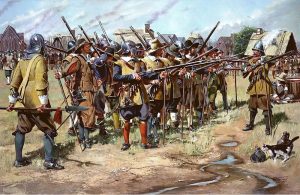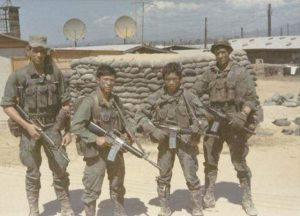
Structured Conflict is rooted in the nature of man separate from His Creator. The quest for power, the love of money, the race for resources, economic competition, and the contest between ideas, ideologies, and religions all contribute to this conflict, one that did not begin in the modern era, but traces its roots back to the Garden of Eden, the desire to be like God, and the first murder (one brother killing another).
Modern tools (like finance, statecraft, communication, transportation, and military technology) and the cult-like ideologies of Communism and globalism have only made modern wars more destructive and deadly, and provide the same capabilities for a now-emerging World War III.
“Veterans know better than anyone else the price of freedom, for they’ve suffered the scars of war. We can offer them no better tribute than to protect what they have won for us.”
– Ronald Reagan, 1983
In 1911, the globalist Carnegie Endowment for International Peace found that war was indeed the most effective means to “alter the life of an entire people.”
Though a massively successful businessman, industrialist and philanthropist Andrew Carnegie mistakenly believed that world peace could indeed be accomplished by a one-world government, as he wrote during World War I, “The longer that this war continues and the more terrible its results, the stronger the argument for permanent world peace.”
“As long as there are sovereign nations possessing great power, war is inevitable.”
– Albert Einstein
While Carnegie was wrong to believe that a one-world order created by globalists could transform the corrupted heart of man, he was right to assert that war leaves its mark on society.
For example, far more civilians died in the Russian Civil War than did soldiers (an estimated 12 million civilians compared to 1.5 million soldiers).
Those living in Italy during the Emperor Justinian’s reconquest in the 6th century A.D. found themselves successively ravaged by war, famine, and disease (See A Historical Perspective of Pandemics, March 2021 MIA).
“In the councils of government, we must guard against the acquisition of unwarranted influence, whether sought or unsought, by the military-industrial complex. The potential for the disastrous rise of misplaced power exists and will persist.”
– President Dwight D. Eisenhower, Farewell Address, 1961
Over 13 million Syrians (out of a population of 22 million) have been displaced in the past decade since fighting began in the 2011 Arab Spring.
Warriors and their families sacrifice much, often paying a horrific price. More Vietnam veterans have taken their lives after the war than died in the Vietnam War.
Veterans have had to cope with PTSD (in all wars), Agent Orange (Vietnam), Gulf War Syndrome, and other physical and psychological afflictions (not to mention the bodily injuries sustained).
“There are few historians who would challenge the fact that the funding of World War I, World War II, the Korean War, and the Vietnam War was accomplished… through the Federal Reserve System. An overview of all wars since the establishment of the Bank of England in 1694 suggests that most of them would have been greatly reduced in severity, or perhaps not even fought at all, without fiat money.”
– G. Edward Griffin, The Creature From Jekyll Island: A Second Look at the Federal Reserve
American soldiers held in Japanese prison camps during World War II suffered the highest death rates in American history – a staggering 40%! But at the same time, war tests and forges character.
In America, those who lived and served through the Great Depression and World War II were called “The Greatest Generation” for their tenacity, heroism, and sacrifice.
Globalists have called for three world wars, out of which they hope their world government will rise, like a phoenix from the ashes. Before we can understand the race to World War III, we must first reflect on history.
- What can we learn from past conflicts?
- How does globalist ideology directly impact war?
- How have globalists used (or even provoked) war to advance global government, including in the World Wars and conflicts since then?
- What valuable lessons can we learn from brave individuals who sacrificed for their country?
“Is there any means known to man more effective than war to alter the life of an entire people?”
– Carnegie Endowment for International Peace, Meeting Notes, 1911
Get ‘under-the-radar’ advice that American families can trust to guide them through the dark.
Sign up today for the McAlvany Intelligence Advisor Monthly Digital Newsletter Package. Over 46+ years of comprehensive and contrarian geopolitical, cultural & financial analysis with more than 20,000+ subscribers served.
Your Package Includes:
- Digital Monthly Newsletter
- Printable Monthly Newsletter (Black & White Version)
- Condensed Monthly Summary (Quick Read)
- Audio Monthly Summary (Private Podcast or Online Streaming)
- 2x Free Special Reports
- And More…







